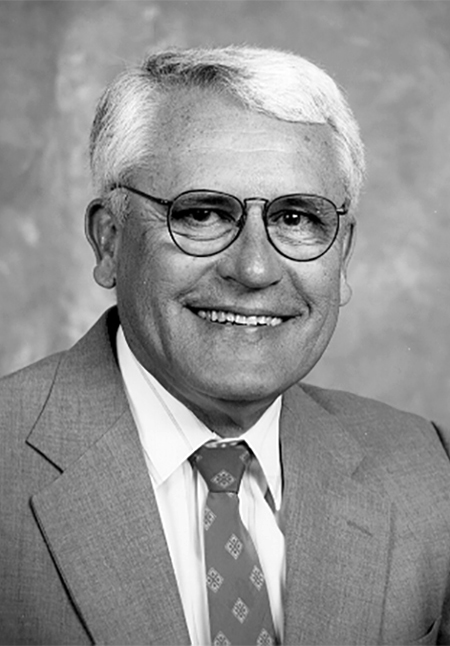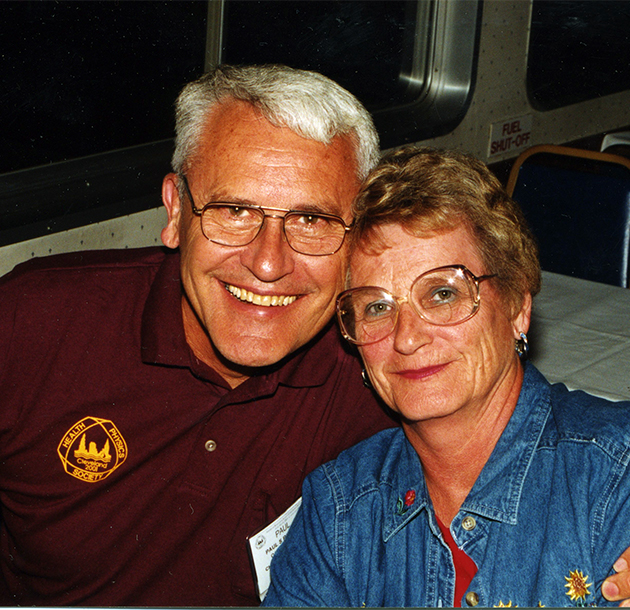In Memoriam: Paul S. Rohwer
1935-2016
by Patricia Scofield


♦♦♦
To view the HPS History Committee interview with Paul Rohwer, click here.
♦♦♦
The Health Physics Society (HPS) has lost an icon and the world has lost a true gentleman. Paul Stirling Rohwer, 80, of Oak Ridge, Tennessee, died peacefully at his home on 4 June 2016. Born in Cedar Falls, Iowa, on 8 November 1935 to parents John and Ruth Rohwer, Paul had a long and distinguished career in health physics. He was a mentor and positive influence to those of us who knew him professionally and personally.
He was interviewed for the October 2000 issue of Health Physics News shortly after becoming president of HPS. He was also interviewed in a video by the HPS History Committee in 2001. These interviews tell Paul's story most eloquently. It is a wonderful story of how a young man from Dike, Iowa, graduated from a high school class of 24 and ultimately went on to earn a PhD in radiation biology from the University of Rochester Medical School. Along the way, Paul served in the US Army's 280 mm Atomic Cannon Artillery Unit and worked at the University of Michigan, Brookhaven National Laboratory, and Oak Ridge National Laboratory (ORNL).
After obtaining his PhD through the sponsorship of the US Atomic Energy Commission's (AEC) Advanced Health Physics Fellowship Program, Paul joined the staff of ORNL's Internal Dosimetry Section under Walter Snyder in the Health Physics Division. Throughout his 32-year career (1966–1998) at ORNL, he worked in research, development, and service organizations, ultimately moving into management positions related to health physics. Before retiring, he was head of the Environmental Management Section at ORNL. If you worked for Paul, you knew that he cared about the people he supervised—he sought to provide staff development opportunities, and he was well known for supporting staff with upper management.
Paul's major technical contributions to health physics started shortly after he began his career at ORNL. Under the initial mentoring of Walter Snyder, he developed the complex, multiradionuclide, external dosimetry models that were to be applied to estimate potential exposures if a sea-level canal were to be excavated with nuclear devices under the Plowshare Program. That program was abandoned by the AEC in the late 1960s, but Paul's dosimetry models proved to be the best available for estimating potential radiation doses from routine and accidental releases from nuclear reactors, as required by the Nuclear Regulatory Commission in environmental impact statements.
Along with these accomplishments, Paul held numerous leadership positions in HPS, which he joined in 1963. Soon after accepting employment at ORNL, Paul received his certification in health physics from the American Board of Health Physics. During his years of HPS membership, he served the Society as a fellow, Program Committee chair, Annual Meeting Place Committee chair, treasurer, Finance Committee chair, Rules Committee chair, International Radiation Protection Association delegate, and ultimately Society president in 2000–2001. He also served as treasurer and president of the East Tennessee Chapter of the HPS. Paul was active in the American Academy of Health Physics, which he served as president (1992) and chair of the Professional Standards and Ethics Committee (2007–2009).
Paul gave a great deal not only to his profession but also to his family and community. He met his wife Sandy while he was in graduate school working on his master's degree. They had four children (Scott, Peggy, Peter, and Paige) and enjoyed a variety of water sports, family camping, hunting, and gardening. Paul was a talented athlete, excelling especially in basketball and volleyball. He was on the Board of Habitat for Humanity for many years in Oak Ridge and was also very active at First Presbyterian Church in Oak Ridge.
Paul was a consummate gentleman: kind, courteous, and respectful of others. In addition to being one of the most beloved and respected presidents of the Society, he was counselor and mentor to many aspiring health physicists. He will always engender fond memories in those whose lives he touched and those he inspired to leadership roles.
Many HPS members have shared their memories of Paul's dedication and commitment to his profession and of his fairness when he chaired meetings of the HPS Finance Committee and Board of Directors. It was a true pleasure and honor to have had an opportunity to spend time with Paul. He will be sadly missed by both his colleagues and friends, who were often one and the same.



